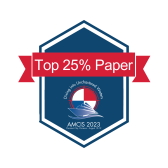Paper Type
ERF
Description
We describe a pedagogical study in which we designed and implemented a module for undergraduate Management Information Systems (MIS) students, aimed at preparing them for an increasingly AI-impacted business environment and society. We developed a learning module that taps their inherent motivation to make a meaningful difference, challenging them to ideate applications of AI for social good (AI4SG), focused specifically on sustainability. We piloted the module in an existing introductory MIS course, first establishing a range of fundamental AI capabilities through hands-on demos and study cases. Then, with instructor guidance, the student teams, working in a social entrepreneurship "start-up" context, identified sustainability challenges impacting their own communities and worked together to propose and pitch AI-powered solutions. The results suggest that students find this approach deepened their understanding of sustainability issues in their communities, improved their knowledge of how AI could address social issues, and improved their confidence in their ability to innovate.
Paper Number
1618
Recommended Citation
Chen, Yu and Hill, Timothy R., "AI for Social Good (AI4SG) Education in an Undergraduate Introductory MIS Course" (2023). AMCIS 2023 Proceedings. 20.
https://aisel.aisnet.org/amcis2023/sig_ed/sig_ed/20
AI for Social Good (AI4SG) Education in an Undergraduate Introductory MIS Course
We describe a pedagogical study in which we designed and implemented a module for undergraduate Management Information Systems (MIS) students, aimed at preparing them for an increasingly AI-impacted business environment and society. We developed a learning module that taps their inherent motivation to make a meaningful difference, challenging them to ideate applications of AI for social good (AI4SG), focused specifically on sustainability. We piloted the module in an existing introductory MIS course, first establishing a range of fundamental AI capabilities through hands-on demos and study cases. Then, with instructor guidance, the student teams, working in a social entrepreneurship "start-up" context, identified sustainability challenges impacting their own communities and worked together to propose and pitch AI-powered solutions. The results suggest that students find this approach deepened their understanding of sustainability issues in their communities, improved their knowledge of how AI could address social issues, and improved their confidence in their ability to innovate.
When commenting on articles, please be friendly, welcoming, respectful and abide by the AIS eLibrary Discussion Thread Code of Conduct posted here.




Comments
SIG ED